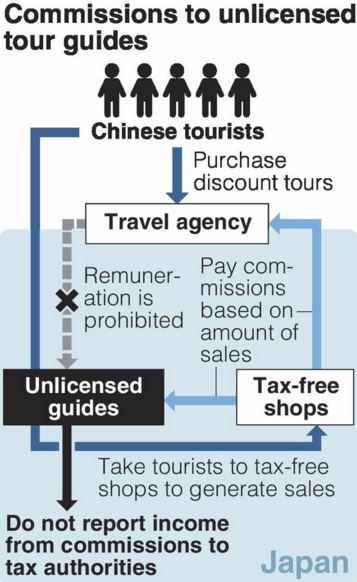Unlicensed Chinese guides have been taking Chinese tourists on “bakugai” shopping sprees to tax-free shops and receiving sales commissions from some retailers, according to an investigation by national tax authorities.
In the past there have been problems with unlicensed tour guides coercing tourists on package tours into buying expensive goods.
But this is the first time that the national tax authorities have obtained a list of commission payments made to unlicensed guides, discovered after the authorities’ tax inspection into a company operating tax-free shops.
Many of the unlicensed guides have not been reporting sales commissions earned from this practice with their regular income to tax offices.

The tax authorities inspected a company based in Shinjuku Ward, Tokyo, that operates a major tax-free shop chain. It operates branches mainly in Tokyo, Fukuoka and Sapporo, and hosts tourists on package tours in collaboration with travel agencies in China and South Korea.
According to sources, the Tokyo Regional Taxation Bureau obtained the list during the inspection.
The list included the names of dozens of guides and the amount of commission paid to each of them.
The bureau found that the company had paid guides who took tourists to their tax-free shops, and the travel agencies that employed the tour guides.
The amount paid by the company corresponded to the total cost of the tourists’ purchases.
The total paid out by the company for this practice in 2015 was more than ¥2 billion (S$2.7 billion).
People who work as tour guides for foreign tourists in Japan must possess a national vocational qualification as a licensed guide interpreter.
However, some travel agencies that organise bakugai tours in Japan get around this by using as volunteers guides from China who live in Japan, the sources said.
These unlicensed guides introduce tourists to tax-free shops and receive sales commissions in return.
A source linked to the company said: “We didn’t confirm whether the guides were licensed. It’s not rare that such guides earn tens of millions of yen annually. It’s difficult to attract large numbers of customers without the commission system, so we have no choice but to continue this practice.”
Sources in the industry revealed that other major tax-free shops have also paid commissions to tour guides.
Travel agencies in China, as well as Japanese travel firms operated by Chinese nationals, often employ unlicensed guides. Travel agencies benefit from this practice by offering discounted packaged tours and propping up their profits with the sales commissions earned.
As a result, it has become difficult for Japanese travel agencies using licensed tour guides to market their packaged tours to Chinese travellers.
The tax authorities’ investigation has so far found that the company operating the tax-free shops has reported the commission payments as business costs to tax offices. But many of the guides in question are unlicensed and have not reported their incomes to tax offices.
The tax authorities intend to begin investigations into dozens of unlicensed guides and to potentially impose additional taxes after conducting hearings to discover why income earned from sales commissions was not reported.
Tax-free shop
Retailers who are licensed to sell products to foreign tourists without charging consumption tax. At duty-free shops in airports, tariffs and alcohol taxes are also exempted. Some department stores, large-scale electronics stores and drug stores offer a tax-free service. As of April this year, there were 35,202 tax-free shops in Japan. Recently health foods and over-the-counter medicines have sold well at these shops.
Licensed guide interpreter
The vocational qualification for guiding foreign tourists, mainly to tourist spots, in Japan. Guides are required to pass tests for not only foreign languages but also Japanese history and geography. The pass rate is about 20 per cent.
As of April this year, there were about 20,000 registered licensed guide interpreters. About 70 per cent of them are English-speaking guides.
People without the license are prohibited from working as tour guides by law, with penalties for violators, including cash fines. The Japan Tourism Agency said that it does not know whether the penalty clause has been imposed in the past.




